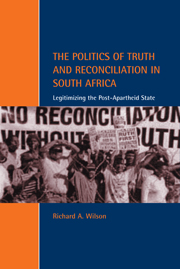Book contents
- Frontmatter
- Contents
- List of Acronyms and Glossary
- Maps
- Preface and Acknowledgements
- 1 Human Rights and Nation-Building
- PART I Human Rights and Truth
- 2 Technologies of Truth: The TRC's Truth-Making Machine
- 3 The Politics of Truth and Human Rights
- PART II Reconciliation, Retribution and Revenge
- Notes
- Bibliography
- Index
2 - Technologies of Truth: The TRC's Truth-Making Machine
Published online by Cambridge University Press: 10 November 2009
- Frontmatter
- Contents
- List of Acronyms and Glossary
- Maps
- Preface and Acknowledgements
- 1 Human Rights and Nation-Building
- PART I Human Rights and Truth
- 2 Technologies of Truth: The TRC's Truth-Making Machine
- 3 The Politics of Truth and Human Rights
- PART II Reconciliation, Retribution and Revenge
- Notes
- Bibliography
- Index
Summary
Whereas the last chapter framed the overall place of the TRC in the South African transition, this chapter examines how the Commission operated on a day-to-day level, and in particular how the Commission sought to fulfill its mandate to provide a truthful account of human rights violations over a 34-year period.
In the press and in public debate, there was a great deal of opposition to the truth-finding mandate of the TRC, particularly from former apartheid political parties such as the National Party and Conservative Party, as well as from some central-right liberal quarters. Anthea Jeffery (1999), for one, asserted that the TRC was neither objective nor neutral but was biased in favor of the ANC and liberation movements, and that it did not adequately uphold legal standards of investigation. These debates are dealt with in chapter 3, where I contend that political party bias was not the most pronounced or significant feature of the TRC. Moreover, concentrating solely on the overt, high politics can divert attention from a close examination of the TRC's methods. Before looking at observable political conflict over past truths, we need to look at logically prior questions of the conceptualization and formulation of official truths – classifications upon which other distinctions and assertions were made.
The hidden policy decisions on truth-making and the invisible technologies of bureaucratic truth production have so far received little elucidation or analysis either in the South African case or in truth commissions elsewhere.
- Type
- Chapter
- Information
- The Politics of Truth and Reconciliation in South AfricaLegitimizing the Post-Apartheid State, pp. 33 - 61Publisher: Cambridge University PressPrint publication year: 2001

